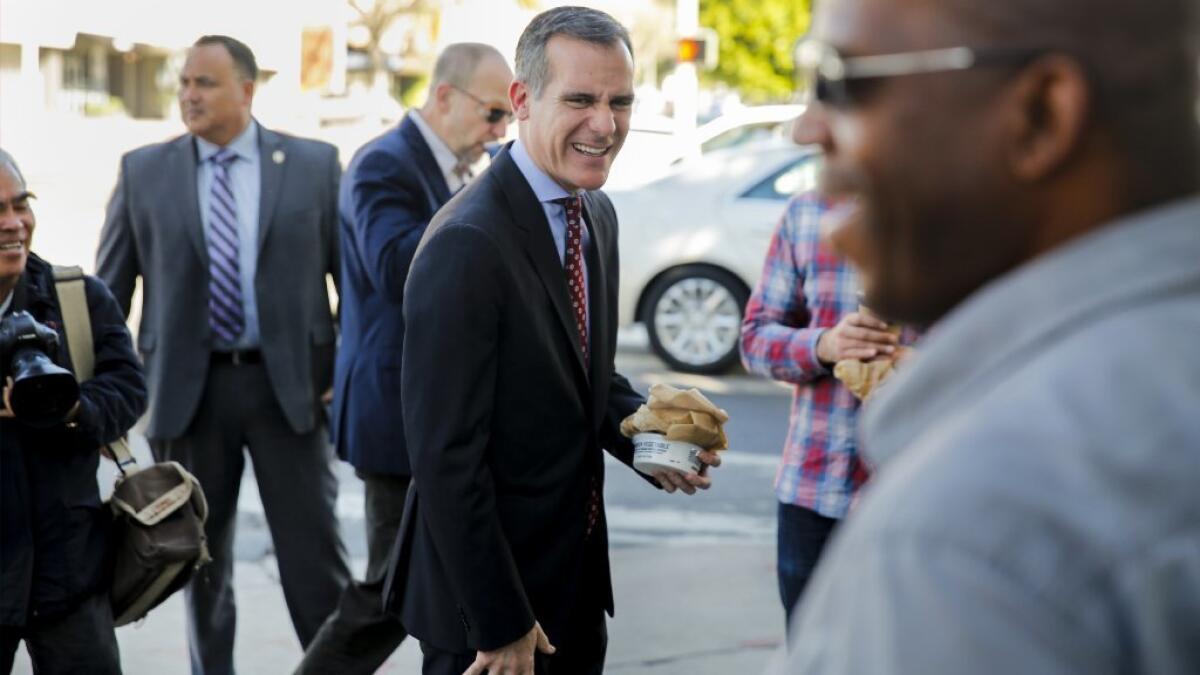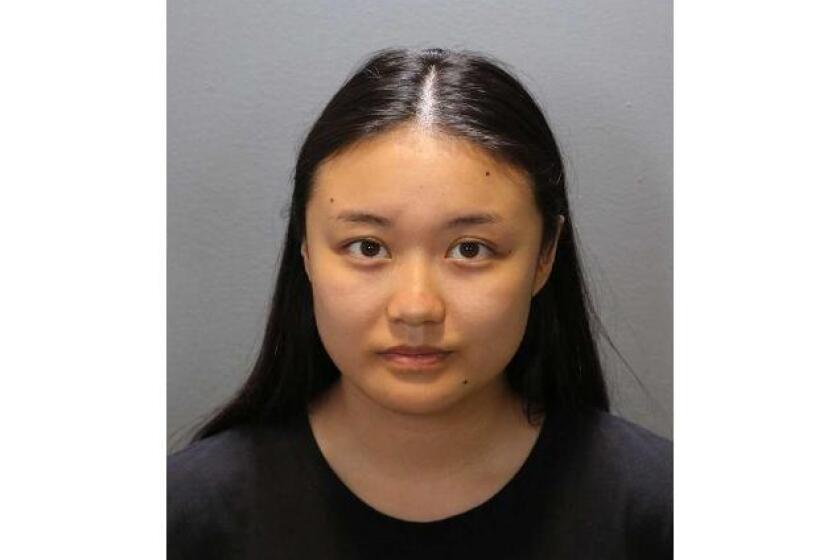Garcetti now has a mandate — but how he will use it has City Hall and the political world guessing

Los Angeles Mayor Eric Garcetti lingered at his election party Tuesday night in Pico-Union, staying late to pose for selfies with supporters and celebrate with longtime aides.
The mayor had a record-setting night. He won a higher percentage of the vote than any of his predecessors in more than a century. Moreover, voters appeared to back the mayor’s vision for Los Angeles — an urban city with denser development along transportation lines — by soundly rejecting a slow-growth measure that was also on the ballot.
But what Garcetti does with the mandate remains a subject of speculation both inside and outside City Hall. The mayor is known for being risk-averse, but he now faces a crucial decision: Stay in the job or run for higher office.
The mayor has not ruled out running for either U.S. Senate or governor in 2018. Tuesday’s win could give him more political standing if he chooses to run.
Asked Wednesday if he has a timeline for deciding whether to jump into the governor’s race, Garcetti said: “Absolutely not. I’m just focused on being mayor.”
Garcetti could also serve out his 5 ½-year term, using his big margin of victory to push through a bolder agenda. But that also comes with risk.
The election of Donald Trump has transformed the political landscape, sparking more activism in liberal L.A. and pushing Garcetti and other political leaders to react on issues ranging from immigration to climate change. Garcetti is also trying to secure the 2024 Olympics for L.A., a task some have said has gotten harder since the rise of Trump.
The president’s crackdown on immigrants has heightened concerns that the International Olympic Committee may choose Paris over L.A.
In a sign of these new challenges, the mayor’s victory speech Tuesday was interrupted by protesters who want him to take a tougher stand against Trump on immigration issues.
Because Garcetti faced token opposition in the mayoral election, he didn’t have to run much of a campaign or lay out his vision for a second term.
Amid a third year of rising crime, Garcetti last week announced a goal of taking 20,000 guns off the streets in the next five years. He said the Los Angeles Police Department will hire more civilian employees and shift some of its more than 9,000 sworn officers from desk jobs to street patrol.
Building off Measure M, which voters last fall approved to fund the most ambitious transit expansion in Los Angeles County history, the mayor wants to do more to relieve traffic, he said.
He also held a press conference Thursday to announce several planning department reforms, such as barring some types of meetings between planning commissioners and developers.
The mayor told reporters he’d been unfairly labeled as “pro-density” and said he’s trying to prepare for the influx of people moving into Los Angeles. The announced planning reforms come after voters rejected Measure S, which would have halted some types of development across the city.
With such a wide margin of victory on Tuesday, Garcetti “has the wind at his back,” said Jaime Regalado, a professor emeritus of political science at Cal State L.A.
“But what he does with it remains to be seen,” Regalado added. “Whatever decision he makes is going to be fraught with a bit of chance and bit of danger.”
First elected in 2013, the mayor rode a economic recovery wave that spurred the development of housing, restaurants and shops in neighborhoods such as downtown Los Angeles, Venice and Hollywood. The improved economy helped raise city revenues to fund Garcetti’s “back to basics” plan — paving more streets and trimming more trees — and restore cuts to the police and fire departments.
But the financial turnaround also brought rapid gentrification. Homelessness surged and crime rose under Garcetti’s watch. The economic disparity seen in San Francisco and New York is now evident in Los Angeles, which has a glut of minimum-wage jobs but high rents.
Lawsuit payouts by City Hall and pension costs are chipping away at the city’s funds. Garcetti has also committed to hiring thousands of new employees in the coming years, another financial drag.
Initial results show Garcetti picked up nearly 81% percent of the vote in an 11-way contest, a margin that outpaced that of every other L.A. City Hall politician who faced a challenger in Tuesday’s election.
Tom Hogen-Esch, professor of politics at Cal State Northridge, believes Garcetti’s focus on the nuts and bolts of governing worked with voters.
“Garcetti doesn’t have a lot of major victories on his resume, but he’s certainly proven himself to be a competent manager,” Hogen-Esch said. “Certain times call for vision, and other times call for competent managers.”
The mayor has more freedom to undertake bolder initiatives in a second term, Hogen-Esch believes, because it will be 1 ½ years longer than the usual four-year term. The extended term is due to an upcoming change in mayoral election dates to line up with gubernatorial elections.
“He has the luxury of time to craft something more innovative or politically risky,” Hogen-Esch said.
Stuart Waldman, president of the Valley Industry and Commerce Assn., said the mayor’s reelection win should encourage him “to take bold action.”
While Garcetti has moved to lower the city’s business tax since taking office, Waldman suggested this week that the mayor eliminate the tax — which businesses argue puts local firms at a competitive disadvantage — during his second term.
Asked if his large win gives him license to think bigger, Garcetti argued he’d pushed for bold initiatives in his first four years. He cited a new earthquake retrofitting law, expansion of the county transit system, and a higher L.A. minimum wage as examples, stating he’d done “big things the first time and I’m not going to stop doing that.”
As he gears up for his second term, rising crime will put pressure on Garcetti to hire police officers. “Policing is the core service of any city,” said Hogen-Esch, “and it was the one area of vulnerability” in the election.
Garcetti’s election night speech was interrupted by a protest organized by the Los Angeles chapter of the Democratic Socialists of America, a leftist group that has seen its membership surge across the nation following Trump’s election.
Many of its members were supporters of U.S. Sen. Bernie Sanders’ insurgent Democratic candidacy for president, and now they have turned some of their energies to local issues.
Standing on the sidewalk outside Garcetti’s election party, protester Tricia Todd accused the mayor of “speaking out of both sides of his mouth” on the “sanctuary city” label. The mayor has declined to use the phrase, saying it doesn’t apply to Los Angeles.
Despite her frustration, the Los Feliz resident said she voted for Garcetti in Tuesday’s election.
Times staff writers Emily Alpert Reyes and David Zahniser contributed to this report.
Twitter: @dakotacdsmith
More to Read
Start your day right
Sign up for Essential California for news, features and recommendations from the L.A. Times and beyond in your inbox six days a week.
You may occasionally receive promotional content from the Los Angeles Times.







